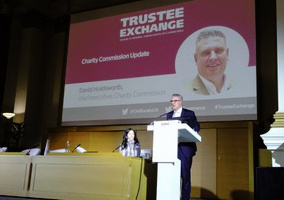Paying trustees could risk creating a “two-tier system”, a panel of sector leaders has warned, with some charities unable to afford to remunerate board members.
Speaking at a webinar yesterday as part of this year’s Festival of Trusteeship, representatives from the Charity Commission, Association of Chairs (AoC) and Board Racial Diversity UK all argued against paying trustees but agreed that diversity on boards should increase.
David Holdsworth, chief executive of the commission, told the event: “I would keep the volunteer principle of trusteeship. I know that’s controversial.
“I know there are different views in the sector, but as the regulator, what we do get to see from our research, and certainly me from my inbox, is how important that [voluntary trusteeship] is to public trust and confidence.
“And when you think about what charities need to thrive, to deliver, to attract public contributions, to keep the tax breaks, it is public trust and confidence. It’s really, really critical.”
Holdsworth added that “there are methods to make that trusteeship is open and that people don’t lose out financially by taking those roles on”, such as paying expenses including for travel, childcare costs, food and accommodation.
Earlier this year, the commission published revised guidance, emphasising the voluntary principle of trusteeship, while Holdsworth stated at an event in April that voluntary trusteeship “is no barrier to diversity”.
‘They are there for the cause, not to be paid’
Holdsworth’s sentiments were echoed by other panellists during the event.
Liz Lowther, CEO of the AoC, said: “I think the one thing that isn’t going to become mainstream is paying trustees.
“David’s already mentioned the fact that it’s a really important ethos of the sector that trustees are trusted because they are there for the cause, not to be paid.”
Citing a recent consultation by AoC, Lowther described paid trusteeships as “the single most divisive question”.
The survey of more than 600 charity board members previously found that female and self-employed respondents were keener to see restrictions on trustee pay eased, while male and retired board members were less positive.
Lowther added: “Some people think it would increase the diversity of boards. Others think it would just create a two-tier system, and a lot of charities would not be able to do that. So, I think that would be a no from me.”
Henry Hughes, a founding trustee of Board Racial Diversity UK and an advocate for young trustees, agreed that trustees should not receive payment, adding: “I don’t want to be paid for my work in the charity sector, because it’s my goodwill.
“It’s my good time and I see so many other people’s goodwill when I do my work.”












